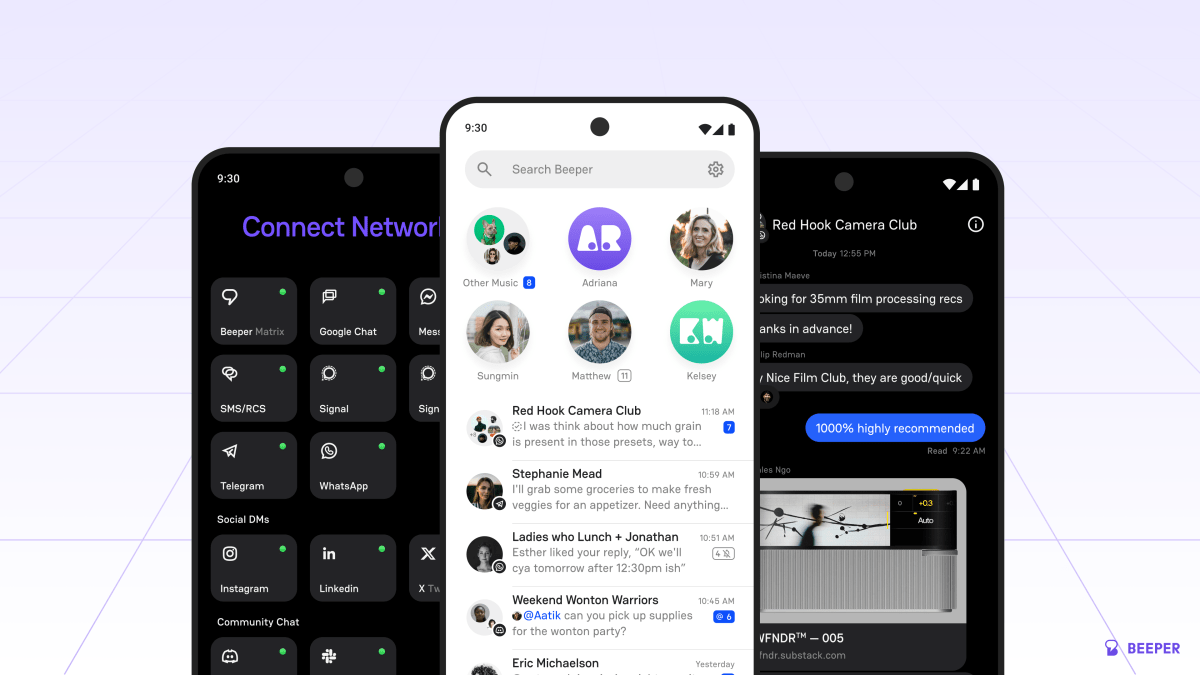WordPress.com owner Automattic acquires Beeper, the company behind the iMessage-on-Android solution that caught the attention of the Department of Justice during its antitrust lawsuit against Apple. This move marks Automattic’s second purchase of a cross-platform messaging solution, following their acquisition of Texts.com last October.
According to sources close to the matter, Automattic spent $125 million on the deal.
Beeper founder Eric Migicovsky, who is also the creator of the Pebble smartwatch and a Y Combinator Partner, will now take on the role of Head of Messaging at Automattic. This position was previously held by Kishan Bagaria, the founder of Texts.com.
In a statement, Automattic commented that they have already started the process of onboarding the Beeper team and are seeing promising results, but they are not yet prepared to share any details about changes to their organizational structure. It is also unclear what Bagaria’s new title will be, but he will continue to work on Beeper alongside Migicovsky.
The combined team of 25 from Beeper and 15 from Texts.com will work together to incorporate the best features of each company’s product into one platform, as explained by Migicovsky:
“[Texts.com] built an amazing app that’s more desktop-centric and iOS-centric. So we’ll be folding the best parts of those into our app. But going forward, the Beeper brand will apply to all of the messaging efforts at Automattic,” he said. “Kishan … I’ve known him for years now — there’s not too many other people in the world that are doing what we do — and it was great to be able to combine forces with them.”
The acquisition, which was finalized on April 1, demonstrates Automattic’s belief that the future of messaging will be open-source and able to function across various platforms, rather than being tied to specific proprietary platforms like Meta’s WhatsApp or Apple’s iMessage. And Migicovsky shared that Beeper’s ultimate goal is to transition users to their own open-source chat protocol called Matrix, which has been described as a “spiritual successor” to XMPP and focuses on secure messaging.
It is no coincidence that Automattic had previously invested $4.6 million in Element (formerly known as New Vector), another company utilizing Matrix. They also contribute annually to Matrix.org.
Migicovsky revealed that the acquisition process began due to the high cost of running Beeper and the need for additional funding or a buyer. Prior to the acquisition, Beeper had already secured $16 million in outside funding, including a Series A from Initialized Ventures and investments from Y Combinator, Samsung Next, Liquid2Ventures, and angel investors Garry Tan, Kevin Mahaffey, Niv Dror, and SV Angel.
In Migicovsky’s own words:
“I’ve known Matt [Mullenweg, Automattic founder and CEO] for years now. We were looking to find a partner that could financially support this. One of the reasons why there are no other people building this type of app is it costs a surprisingly large amount of money to build a damn good chat app.”
As for Beeper’s current products, the company has briefed the Department of Justice on their experience with Apple’s blockage of the Beeper Mini app, which aimed to bring iMessage to Android. As a result of Apple’s actions, Beeper Mini is no longer being updated.
However, Beeper has launched an updated version of their core app on Android, which offers a connection to 14 different messaging services such as Messenger, WhatsApp, Telegram, Signal, Instagram DM, LinkedIn, Twitter/X, Discord, and Google Messages. Beeper’s biggest user base is on Android, with 70% of their users utilizing Google’s smartphone operating system.
In this newly launched version of Beeper, the company is also implementing end-to-end encrypted messaging through Signal, with plans to expand to WhatsApp, Messenger, and Google Messages soon after.
Due to Apple’s restrictions, Beeper is not prioritizing iMessage integration, given the complications they faced with the shutdown of Beeper Mini. However, they are optimistic that regulatory changes could open up options for iMessage compatibility, citing the Department of Justice’s lawsuit and the FCC’s investigation. In the meantime, Beeper has added support for RCS, which solves iMessage to Android issues such as low-quality images and videos, lack of typing indicators, and lack of encryption.
The redesigned Android app features a new icon, updated design, instant chat opening and sending, the ability to add and modify chat networks directly on the app without needing a desktop version, local storage of all chats on the device, and full search functionality.
The 10,000 Android users currently testing the beta version of Beeper will need to manually download the new app from Google Play, as it will not automatically update.
Additionally, the app will now be available to the 466,000 individuals on Beeper’s waitlist. They will join the 115,000 current users of the app, which is utilized by tens of thousands daily. Beeper is compatible with Android, iPhone, iPad, ChromeOS, macOS, Windows, and Linux.
The team has plans to bring feature parity across all platforms in the coming months as they revamp the iOS and desktop versions of the app. They also have intentions to expand Beeper’s services to include Google Voice, Snapchat, and Microsoft Teams. And with their widget API, developers can also build on top of Beeper. Plus, since Matrix is an open standard, there is potential for developers to create alternative clients for Beeper as well.
The app will generate revenue through a premium subscription model, with pricing to be determined in the future. Currently, Beeper is available for free.
Similar to Automattic, the Beeper team is a remote workforce, with team members located in Brazil, the UK, Germany, and the US. For now, Texts.com will continue to operate separately as the teams integrate the two messaging apps.








